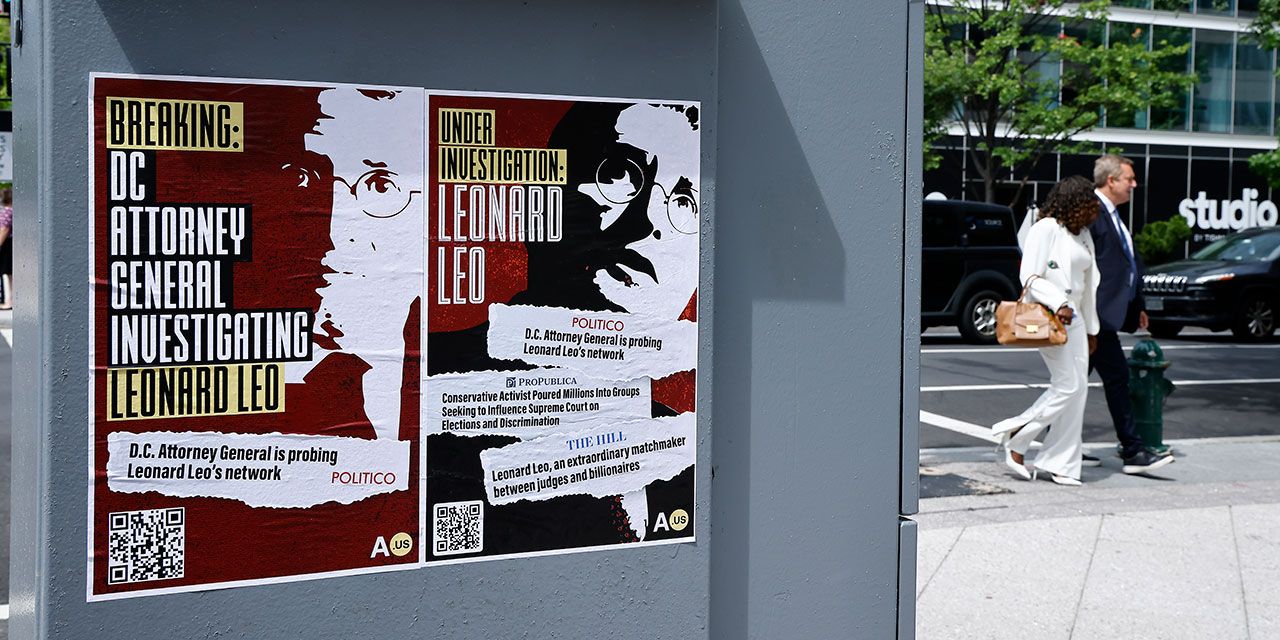
Photo by Paul Morigi/Getty Images for Accountable.US
Prosecutorial Indiscretion
Originally published in City Journal
Washington, D.C.’s attorney general puts politics before public safety.
Amid a surge in youth-driven violent crime in the nation’s capital, newly elected attorney general for the District of Columbia Brian Schwalb is laser-focused—on his political enemies.
Reports suggest that Schwalb is investigating, of all people, Leonard Leo, the longtime chairman of the Federalist Society. Leo is an odd target for a probe, since his supposed malfeasance is financial self-dealing related to nonprofits registered in other states. If those allegations are substantiated, they would constitute federal tax and wire-fraud crimes—infractions far outside the jurisdiction of D.C. authorities. Stranger still, the precipitating complaint against Leo for alleged “dark money” shenanigans was filed by a group itself affiliated with other billionaires’ dark money. This one just happens to share Schwalb’s progressive worldview.
On its face, the investigation smacks of “lawfare,” wielding of the legal system to punish political foes. Schwab’s dubious inquiry poses a greater danger than further eroding trust in our justice system, however. It also endangers lives, since Schwalb is diverting resources away from tackling D.C.’s juvenile crime wave.
The doctrine of “prosecutorial discretion”—the ability of prosecutors to choose what cases to pursue and how—is the bedrock of our common law tradition. Prosecutors must make value judgments and allocate resources according to the most urgent and critical public-safety needs, while upholding a fair and equal justice system for all. For law enforcement in any major city, there are usually too many instances of wrongdoing and not enough time and money to pursue them all. Choices must be made. Prosecutorial discretion is about prioritization. The deference afforded prosecutors’ decisions is near absolute, though this doesn’t mean that their judgment is infallible, or even prudent.
Such is the case with Schwalb, whose office, under D.C.’s peculiar local-federal criminal-justice system, prosecutes misdemeanors and all offenses by those under 18, in addition to consumer and civil litigation. The Justice Department handles adult felonies.
During his 2022 campaign to replace D.C.’s outgoing attorney general, Karl Racine, Schwalb promised to implement a “Six-Point Crime Reduction and Neighborhood Safety Action Plan.” His top priority, Schwalb said, was to “hold violent and repeat offenders accountable” with “swift, certain, fair adjudication and meaningful consequences.” After taking office in January, Schwalb reiterated that commitment, saying, “we charge (or “paper”) all gun cases and, whenever a gun is used in a crime, we ask the Court to detain the young person.”
He did an about-face almost immediately. This summer, Schwalb slammed Mayor Muriel Bowser’s recently passed emergency legislation that would, among other things, allow judges to expand pretrial detention for dangerous juvenile offenders. Schwalb argued that the bill would “result in more children being locked up pre-trial even when they pose no threat to public safety . . . the current detention statute does not need to be fixed, or changed.” (If not made permanent, the legislation will expire in October.)
While hard numbers on youth prosecutions are scant, the available data suggest a dangerously lenient approach. Under Schwalb and his predecessor, more than a third of juvenile cases were dropped or diverted for arrests made between October 2022 and mid-February 2023. Last year (before Schwalb took office), D.C.’s Metropolitan Police Department made 1,682 juvenile arrests. Almost 700 were for violent or gun-related crimes, including carjacking, rape, robbery, aggravated assault, and possession of a firearm by a felon. And 400 more arrests were for failing to appear in court, tampering with a GPS monitor, or becoming a fugitive. These are offenses that warrant being detained.
Schwalb’s office dropped the case of one 15-year-old carjacker, outraging the teenager’s own foster parent. After an 11-year-old was arrested in May for an aggravated assault and two robberies, Schwalb’s office dropped the charges in early June. Eleven days later, the youth was arrested again for armed robbery and gun possession after trying to steal a delivery driver’s motorbike and threatening to shoot the victim if he didn’t comply.
Carjackings in D.C. have doubled over the last year and risen sevenfold since 2019. So far this year, juvenile suspects account for 64 percent of carjacking arrests, compared with 42 percent in 2019. If these proportions hold, young people will have committed over 500 carjackings this year alone. A little more than 40 percent of these suspects are 16 or under. In July, a U.S. military Afghan interpreter working as a Lyft driver was apparently murdered by four juvenile suspects on Capitol Hill in a botched carjacking.
Yet, while Schwalb stays hot on the trail of conservative activists, he excuses juvenile crime. In April, the attorney general defended his priorities, telling residents at a community meeting who wanted consequences for young criminals, “[k]ids are kids and when you’re talking about teenagers in particular . . . they’re biologically prone to make mistakes—that’s what we’ve all done as we’ve grown up.”
Right. Who hasn’t carried an illegal gun or carjacked someone at some point or another?
Prosecutorial discretion may give Schwalb the power to put politics before public safety, but it is also revealing his terrible judgment—and that, in turn, is further endangering an already-troubled city.
Sean Kennedy is a fellow at the Maryland Public Policy Institute and policy director at the Law Enforcement Legal Defense Fund.





